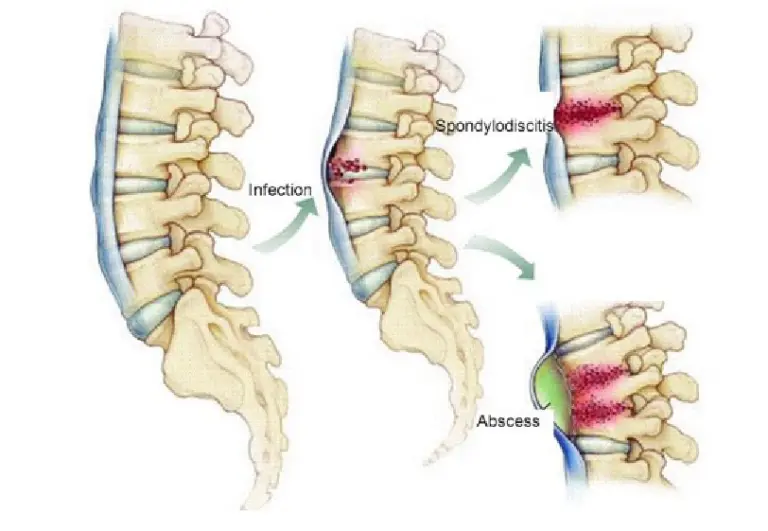Spinal Infections
Service > Spinal Infections

Spinal Infections
Vertebral osteomyelitis refers to an infection of the vertebral body in the spine. It is a fairly rare cause of back pain, especially in young healthy adults.
Generally, the infection is spread to the vertebral body by a vascular route. The veins in the lower spine (Batson’s plexus) drain the pelvis and provide for a direct route of entry for the bacteria to get into the spine Tuberculosis is one of the common cause of Infection in the spine in our Country which can cause fever, back pain, weakness or numbness in lower limbs, bladder and bowel problems. Spinal Infections need aggressive treatment by antibiotics and may require surgery for decompression and spinal fixation
🔷 Spinal Infections – Background
Spinal infections are serious medical conditions that involve infection in the bones (vertebrae), discs, spinal cord, or surrounding tissues of the spine. These infections can develop from bacteria, fungi, or other organisms, and may occur after surgery, from bloodstream infections, or due to direct trauma. Early detection and prompt treatment are critical to avoid permanent damage or life-threatening complications.
📌 Types of Spinal Infections:
Discitis: Infection of the intervertebral disc space
Vertebral osteomyelitis: Infection in the spinal bones (vertebrae)
Epidural abscess: Accumulation of pus between the spinal cord and its outer covering
Spinal meningitis: Infection of the membranes around the spinal cord (can be part of central nervous system infection)
📌 Common Symptoms:
Bacterial or fungal infections (e.g., Staphylococcus aureus, Mycobacterium tuberculosis)
Post-surgical infections
Infections spreading from other parts of the body (e.g., urinary tract, lungs)
Injection drug use or weakened immune system
Tuberculosis of the spine (Pott’s disease)
📌 Typical Symptoms:
Severe and persistent back or neck pain
Fever, chills, or night sweats
Redness or swelling over the spine
Neurological symptoms (numbness, weakness, or paralysis)
Fatigue or unexplained weight loss
Loss of bladder or bowel control (if spinal cord is compressed)
📌 Why Timely Treatment Is Crucial:
Spinal infections can cause irreversible damage to the spinal cord and nerves if left untreated. Timely medical intervention can help control the infection, relieve symptoms, and prevent complications such as sepsis, paralysis, or spinal deformity.
📌 Available Services May Include:
Consultation with spine surgeons, infectious disease specialists, and neurologists
Diagnostic testing (MRI, CT scan, blood tests, biopsy)
Long-term antibiotic or antifungal therapy
Hospital admission and intravenous (IV) medications
Surgical drainage or debridement (if abscess or structural instability occurs)
Post-treatment rehabilitation and spinal support

